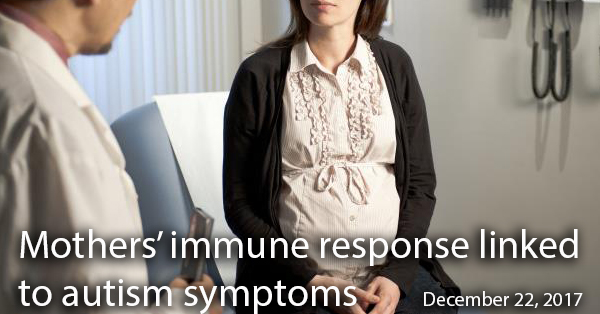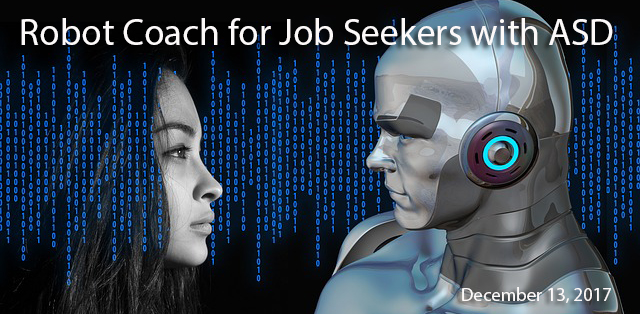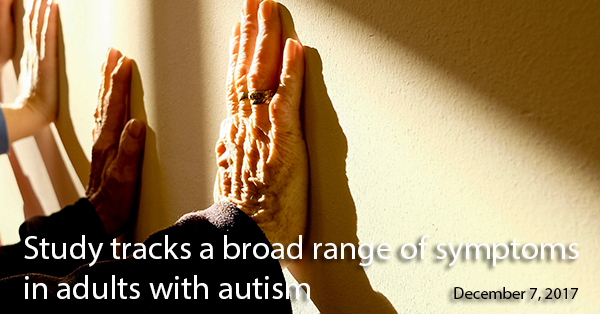Archives
December, 2017
Select a different month in the archive
Autism Symptom Severity and Mothers’ Immune Response
By Chelsea Toledo, M.A. on December 22, 2017

Background: What role the non-genetic factors play towards development of autism spectrum disorders (ASD) is a major concern. Several recent studies have suggested a link between illness or infection during pregnancy and the likelihood that the resulting child have ASD. However, few have established a link between mothers’ history of immune activity and the severity of social differences in the children who go on to receive a diagnosis.
What’s New: A recent retrospective study explored that potential link – comparing the severity of social symptoms in 220 children with ASD against their mothers’ histories of immune activity while pregnant. The researchers administered the Autism Diagnostic Observation Schedule-Generic (ADOS-G) to the children, and had their caregivers complete the Social Responsiveness Scale (SRS) to assess the severity of impairments in the following five areas: awareness, cognition, communication, motivation, and mannerisms. Finally, primary caregivers completed family medical histories as part of the study.
The researchers found:
- SRS scores were higher (indicating greater severity of social symptoms) in children whose mothers had a history of asthma and allergies.
- Symptoms were most severe in the areas of cognition and mannerisms for these children.
- Autoimmune conditions among mothers did not affect autism symptoms in children.
Why it’s important: This is the first study to correlate the severity of ASD social symptoms with maternal immune activity. Future studies following mothers and children over time could further probe this link to shed light on possible interventions.
Help me understand :
| Source(s) : |
| Tweet |
Robot coach for Job Seekers with ASD?
By Paras Kaul and Chelsea Toledo on December 13, 2017

Background: People with autism spectrum disorder (ASD) sometimes experience difficulty seeking employment due to differences in social and verbal skills. Early evidence suggests that leveraging robots in mock job interviews can help to train individuals with ASD for the actual experience.
What’s New: A recent study explored the possibility of leveraging artificial intelligence as a preparatory aid for job seekers with ASD. Fifteen participants between the ages of 18 and 25 with ASD completed a mock job application with questions about one of six jobs they chose to pursue. For five days they interviewed with either the robot or the human at the same time each day. Researchers measured salivary cortisol levels – a biomarker for stress and anxiety - at the same time of day after each mock interview to see if there were any changes.
After their interviews, participants received questionnaires about their performance. Responses from participants who met with the robots indicated improvements in their self-confidence with somewhat reduced levels of stress and anxiety. While cortisol levels were lower among the individuals who interviewed with a robot, the hormone spiked on Day 2 of the exercise – a possible indication of a physical reaction needed for an individual with ASD to perform.
Why it’s important: This study suggests that the stress, anxiety, and self-confidence people with ASD experience in job interviews can be reduced with training from android robots that look like humans. Training in mock job interviews with robots may be useful in addressing social and communicative challenges that prevent the ASD population from getting jobs in the real-world. This possibility – as well as the link between cortisol spikes and interview performance – merits further investigation via larger studies.
Help me understand :
| Source(s) : |
| Tweet |
Symptom Profile in Adults with Autism
By Chelsea E. Toledo, M.A. on December 7, 2017

Background: With increasing prevalence of Autism Spectrum Disorder (ASD) in the past decades, a growing number of families face concerns about caring for children with ASD as they enter adulthood. One question for families and clinicians is whether the conditions that oftentimes accompany ASD – including tantrums, seizure, sleep and gastrointestinal (GI) disorders– will persist as the children age.
What’s new: A recent study tracked a number of symptoms and conditions that tend to accompany ASD in older adults over time. The retrospective study leveraged 35 years of medical records belonging to 74 adults with ASD, obtained with permission from a community agency serving this group. The researchers made several important observations:
- Behavioral and psychiatric symptoms (including self-harm and tantrums) decreased significantly across the board as the individuals aged.
- Physical symptoms differed somewhat among participants older than 50 when compared to their younger peers; the older group experienced more GI symptoms, while the younger group was more likely to experience diabetes and hay fever, and to exhibit physical aggression.
Why it’s important: This study suggests that the behavioral and psychiatric symptoms observed in children with ASD may not persist as the children get older. It also points to possible differences between middle aged and older people with ASD, which merit further study.
Help me understand :
| Source(s) : |
| Tweet |

